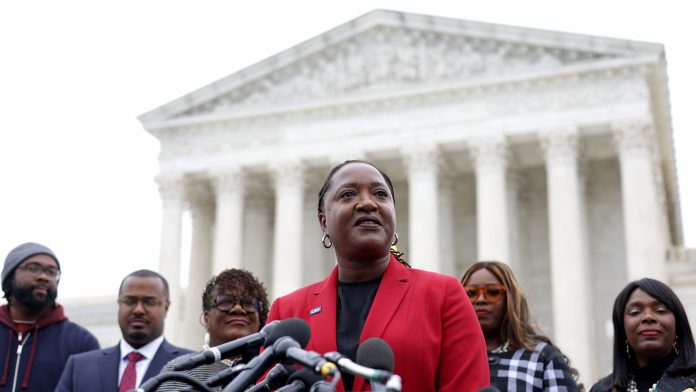A decade’s worth of disappointment has conditioned Black Americans and Democrats to fear voting-rights rulings from the Supreme Court. In 2013, a 5–4 majority invalidated a core tenet of the Voting Rights Act of 1965. Subsequent decisions have chipped away at the rest of the law, and in 2019, a majority of the justices declared that federal courts have no power to bar partisan gerrymandering.
So this morning, when two conservatives joined the high court’s three liberals in reaffirming a central part of the Voting Rights Act, Democrats reacted as much with shock as with relief. Chief Justice John Roberts, who wrote the 2013 decision in Shelby v. Holder that stripped the government’s power to vet state voting laws in advance, today released an opinion ruling that Alabama’s congressional map illegally diluted the votes of Black people by packing them into one majority-minority district rather than two.
[From the March 2021 issue: American democracy is only 55 years old—and hanging by a thread]
The decision in the case known as Allen v. Milligan preserves, for now, the landmark civil-rights law that many legal observers worried the Court would render all but moot. It also could have important ramifications for the 2024 elections and control of the House of Representatives, where Republicans hold just a five-seat majority.
Many Democrats believe that the ruling will have a domino effect on other pending cases and ultimately force three southern states—not only Alabama but also Louisiana and Georgia—to each add a new majority-minority district before the congressional election, which would almost certainly flip seats currently held by Republicans. Texas might have to add as many as five majority-minority districts to its map. “It really clears the path for these cases to move forward hopefully in a quick resolution,” Abha Khanna, a Democratic lawyer who argued the Allen case before the Supreme Court on behalf of Black voters from Alabama, told me.
These potential gains could more than offset the losses that Democrats are anticipating in North Carolina, where a new conservative majority on the state supreme court is expected to draw a congressional map more favorable to Republicans. After the ruling, the nonpartisan prognosticator Cook Political Report immediately shifted its projections for the 2024 elections by moving five House seats in the Democrats’ direction.
Justice Brett Kavanaugh, a 2018 appointee of former President Donald Trump, joined Roberts and the Court’s three Democratic appointees, Justices Sonia Sotomayor, Elena Kagan, and Ketanji Brown Jackson, in the 5–4 ruling. The decision was surprising not only because it ran counter to the Court’s recent jurisprudence on voting rights but also because last year, a majority of justices left in place the same maps that the Court today deemed illegal. That ruling, which came in an unsigned opinion on the Court’s so-called shadow docket, might have made the difference in the Democrats losing their House majority.
“While we were certainly disappointed,” Khanna told me of that decision, “I think today’s victory shows that in this case, justice delayed was not justice denied.”
[From the October 2022 issue: John Roberts’s long game]
Advocates for voting rights were caught off guard. “Supreme Court Shocks Nation by Doing the Right Thing,” one left-leaning group, Take Back the Court, wrote in the subject line of an email that read like a headline from The Onion. George Cheung, the director of a voting-rights group called More Equitable Democracy, told me he was stunned by the ruling: “I and many others assumed that they would undermine if not completely gut what remained of the federal Voting Rights Act.”
Instead, the Court’s majority rejected a bid by Alabama to reinterpret the redistricting provisions of Section 2 of the law as “race neutral,” a change that would have reversed the VRA’s original intent to protect disenfranchised Black voters.
For Democrats, the decision offered a rare moment to celebrate a ruling from an institution in which many in the party have lost faith. The Court’s decisions in earlier voting-rights cases, on gun laws, the environment, campaign finance, and in particular the national right to abortion—which was reversed last year—have led progressives to accuse conservative justices of ruling according to their political preferences instead of the law
The Court’s decision, Khanna told me, shouldn’t have been surprising—even if, to many people, it clearly was. “It’s certainly a remarkable victory for the Voting Rights Act and for minority voting rights,” she said, “but it’s rather unremarkable, because what it says is the law is as we have said it to be for the last nearly 40 years.”

















